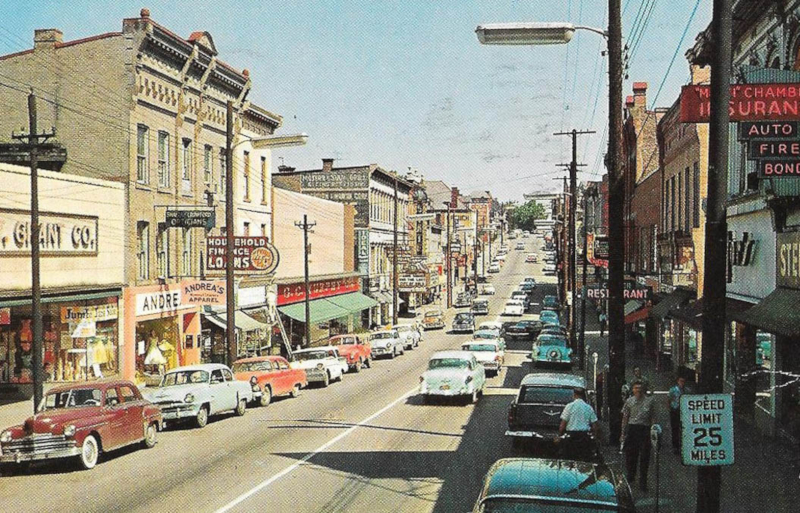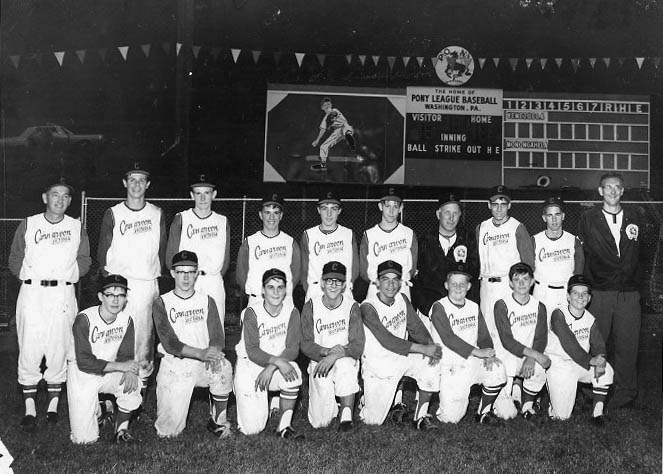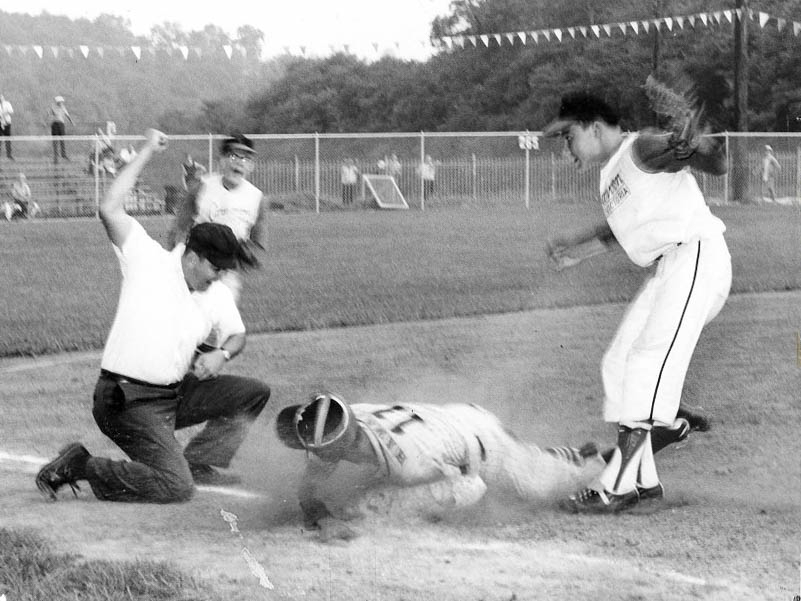A large crowd is watching a baseball game on a warm Sunday afternoon at Sunbury Park in Delta. It’s Aug. 11, 1968. I’m 14 and play third base on a Pony League baseball team called Victoria Carnarvon. I wear a white jersey with Carnarvon in red letters across the front. My face is brown from too much sun. I wear my baseball socks pulled up high.
We’re playing the Prince Albert Cubs from Saskatchewan. This is an important game. The winner will represent Canada at the Pony League World Series in Washington, Pennsylvania. I’m feeling nervous.
It’s the final inning, we’re one run ahead, two out, last chance for Prince Albert. Daryl Kubicek, all hustle and grit, has just made a game-saving throw for us from deep in the outfield. Prince Albert has the tying run on third base.
Bob Burrows, our manager, brings Tom Craig into pitch. We’re in a bit of a jam and Craig has a knack for getting hitters out late in the game. Craig is known for his modesty and has asked his parents not to come to the game. They come anyway.
I glance over at Tom Craig. Strands of his hair, covered in sweat, stick to his forehead. “We need just one more out,” I think.
At bat for Prince Albert is Davey-Joe Prytula. Craig pauses and then throws a pitch on the inside of the plate. Prytula swings and hits a slow rolling ball down the third base line. I run in, field the ball and make a high throw to first base. No matter. Darryl Goddard is lean and lanky like his dad. Goddard plants his right foot on first base and stretches out his glove. My throw beats the runner. The game is over. Whoops of joy. We throw our baseball gloves in the air and rush to mob Tom Craig. Holy cow. We’re going to Pennsylvania.
We had to pinch ourselves. The boys from Prince Albert didn’t give up. They were a tight-knit group. Nine players on their team played hockey together in the winter back home.
We had a bit of luck, and good pitching. Glen Wallace is our ace. He is six foot, three inches (tall even for pony league) with wide shoulders and sandy brown hair. He pitches with authority and can hit the ball a mile. He makes everyone on the team a better player.
Then there’s Ray Andre. He’s a fierce competitor who wears his baseball hat down low and throws part sidearm. His best pitch is a lively fastball that darts and swerves as it crosses the plate. There are others. Derrick Fuller is a hard out, a dangerous hitter. Martin Winstanley is a solid, all-around ball player. I could go on.
That was my world: Friends, family and playing baseball.
On Monday, a headline in the sports section of the Victoria Daily Times read “Carnarvons Head for World Series.” A couple of our players were interviewed by Ida Clarkson, a local legend on CHEK-TV. Community organizations helped raise funds, and five days later on a Friday morning we met at Carnarvon Park. Dressed in our Sunday best, we drove to the airport and got on a plane to the United States.
My mom, Jean (some of her friends call her Gina), hemmed my pair of dress pants for the trip. For years she came to my baseball games and sat in the bleachers with other parents. She was petite and outgoing and dressed in a cardigan. There was usually a pack of Du Maurier cigarettes in her purse. My dad, Alex, preferred to sit in the grass along the right field line. He was a longshoreman and a long-time Yankees fan. During a game at Layritz Park, the story goes, he threatened to bop someone in the nose if they didn’t stop bad-mouthing our team.
At the park on that Friday morning, as we gather to start the trip, I notice that our coach Bud Brice, is not there. Are Mr. Holmes and Mr. Mullins coming instead? Standing on the grass, dressed in a sports jacket and tie, is Bob Burrows. Burrows has four sons of his own who play sports. He has a rumpled air about him. He’s in his mid-forties and wears a fedora tilted back on his head. His voice is gentle but firm and he always has an encouraging word to put you at ease. My teammates and I wear ties and black nylon jackets with “Canada” crests sewn on by Ray Andre’s mom, Elka. We mill around and my mom takes a team picture with her Kodak Instamatic. Billy Crawford is smiling, beaming really. Russ Walker, who is full of spunk, has his eyes closed. Wayne Simpson (nicknamed Wiener) has a stocky build and red freckles. Terry Watchman wears green jeans and brown-strapped sandals. Kip Jones sports skinny sideburns. We look hopeful. Tentative.
The trip east is inauspicious. We board a Viscount airplane at the small Victoria airport and it blows three tires when it lands in Calgary. Then on to Cleveland, where we are told our luggage is lost. The airport in Cleveland smells of stale air conditioning and cigarette smoke. Some of us play cards. Others buy hamburgers for 15 cents at McDonald’s. I recall watching people as they moved about the airport. It’s the first time in my life that I’ve seen people from so many different walks of life. There are black Americans and groups of businessmen wearing suits and ties. What I know about the United States is what I have learned from reading the headlines in the newspaper or from watching the CBS Evening News on television. There’s a war on and a presidential election is being held in November. America feels different. It has a history that I know nothing about.

Eventually we arrive in Washington, a town 45 kilometres south of Pittsburgh. Located in a county known for producing coal, Washington is often described as an educated, blue-collar town. We stay in a red brick dormitory at the Washington Jefferson College (founded in 1781). In the school cafeteria at lunchtime there’s corn-on-the-cob and iced tea. Many of the buildings in town are made out of brick or stone. One afternoon I walk four blocks to Main Street and buy the new Doors album, Waiting for the Sun. Near the top of the hill on Main Street is the George Washington Hotel, built in 1922. Further down the street is a movie theatre and a five-and-dime store. The maple or elm trees and hills that dot the neighbourhood are a rich, dark green colour. The weather is muggy. A faint, sweet scent hangs in the air. Washington reminds me of small-town life described in a short story I read once in the eighth grade.
It’s unfamiliar and not like Victoria. Victoria was idyllic and, for the most part, middle class. Washington seemed older. It had more history. It was a small town and the mood was different. I knew nothing about what people did for a living there or what people thought about their country.
I don’t know what to expect in the tournament, but I think we may be the underdogs. Both the North Carolina and California teams have big, strong players. Most American kids have been practicing and playing ball for years. Baseball’s their national pastime. On our third day in Washington, our team travels to Pittsburgh to watch a Pirates’ game at Forbes Field (the great Roberto Clemente is playing right field for the Pirates). Between innings I take a stroll and survey the faces in the crowd and take in the ambience. Later in my room I write a postcard to my parents. I say: “We went to the ball game. The Pirates won. All the teams are here now. Having a nice time. Bill.” I don’t tell them the tap water tastes funny. My roommates Tom Craig, Kip Jones and I sleep on bunk beds. The humidity makes it hard to sleep at night.
In our first game on Aug. 19 we play a team from Maui. There’s a threat of a thunderstorm. Around 4,000 people, dressed in short sleeves, cut-offs and slacks watch the game. Some men wear straw hats. By the sixth inning, Maui is ahead 1-0. Pitching for them is a smooth throwing left-hander, Terrance Takahashi. We need base runners. Up at bat for us is Kip Jones who lines a pitch off the left field fence for a double. Russ Walker is sent out to run for Jones and scores when Martin Winstanley, our shortstop, strokes a single. After Winstanley steals second base, Glen Wallace drives him in with a base hit. Loud cheers from our dugout as Winstanley slides home safely. We’re up by a run. Maui gets one last chance. I trot out to third base.
Glen Wallace starts the seventh inning by walking Anthony Takitani. After a passed ball, Takitani charges into second base. His aggressive base-running style has caught me off guard. Ashley Douglass, our second baseman, moves closer to the bag at second and rubs the bill of his cap. The pick-off play is on. As Wallace turns to throw to Douglass, Takitani sprints towards third base. I immediately turn and face Douglass and I make sure my feet are even with the third base bag. Douglass’s throw is perfect. Takitani slides headfirst stretching out his right hand towards the base. I sweep my glove up and tag him on the shoulder. My body is taut. The crowd stands up. What’s the call? The umpire, crouching near third base, raises his right arm and yells “out!” I feel my adrenaline subside and then relief. The last two Maui hitters ground out. It’s a storybook ending.
At some point during our stay in Washington several of us befriend a few teenage girls. There is an openness about them that is engaging. Some talk with a slight twang in their voices. I exchange addresses with one of the girls and promise to be her pen pal. One day, the girls invite us to an afternoon matinee. Ashley Douglass, Derrick Fuller and I meet them in front of the Penn Theater on Main Street. Fuller is the youngest of three brothers. He has dark wavy hair and a carefree attitude. He and his date are smitten with one another. After the movie Douglass gets a ride from someone’s older brother, a local. Douglass sits in the front seat. Some soul music is playing on the radio. But the older brother wants to change the station. He doesn’t like black music. Douglass recalled the incident this year: “I heard racism for the first time. It blew me away. I was so naive at that time.”

Our next game is against Caracas, Venezuela. Caracas won the Latin American title by beating teams from Cuba, Mexico and Puerto Rico. They’re a good hitting team and they play the game with certain flair. In the second inning they score four runs on six hits off Ray Andre. Peter Michielin, a bright 13-year-old with a mop of hair, relieves Andre. Michielin is a finesse pitcher and he pitches well, but we lose 7-2. Maybe our luck is running out.
Two nights later under the lights we play Covina, California. The Covina players wear old-fashioned cloth uniforms with black lettering. On the bus on the way to the game I overhear two Covina players talking to each other. Their voices are flat. One player asks the other: “How much do you think we’ll beat these guys by?”
Before the first inning is over we misplay routine ground balls, commit seven errors and gradually lose our poise. I recall leaping for a ball that’s hit just over the reach of my glove. Pangs of frustration follow. The runs pile up on the scoreboard and the game goes sideways. After five innings the game is stopped due to the score (it’s called the mercy rule). Final tally is 26-3 for Covina.
Al Kubicek, Daryl’s father, is at the game and is quoted in The Daily Colonist. “They couldn’t pick up the ball. They couldn’t throw it straight when they did get it under control. It was their worst game of the season.”
There’s nowhere to hide after a loss like that. It’s a humbling experience. We’re tired, disappointed and a bit rattled. Still in our uniforms we walk in groups of two and three carrying our equipment to the chartered city bus parked just past the first base dugout and bleachers. The crowd has thinned out and it feels less muggy. I notice a few of the girls that we befriended are crying. No time for ceremony or farewell hugs. On the bus some of us wave goodbye through the rear window.
As I write this 50 years later at a desk looking out my basement window, I replay that game sometimes. How did we lose by such a lopsided score? Was our team in disarray and ill-prepared? Were we intimidated by the size and the confidence of the Covina players? Was it a combination of the sticky August heat and physical fatigue that did us in?
I know Covina was the better team. I do have a theory though. Sometimes during any given baseball game, a team ends up making a few mistakes in an inning, cannot recover and then the game takes on a momentum all its own. Maybe that’s what happened to us or maybe we were just plain lousy that night. Hard to know.
Losing to Covina knocks us out of the tournament. The next morning in the dorm we stuff our belongings and souvenirs, including miniature wooden baseball bats and Hawaiian hats made from palm leaves, into our travelling bags and climb onto another rented bus to start the trip home.
We fly from Pittsburgh to O’Hare Airport in Chicago for a connecting flight to Canada. It’s Saturday, Aug. 24. Young volunteers in the main terminal are handing out Eugene McCarthy for President campaign buttons. In two days the Democratic National Convention is scheduled to start in Chicago. Robert Kennedy’s bid for the nomination had ended in early June when he was assassinated in a Los Angeles hotel. The convention was a choice between McCarthy, who promised to get the U.S. out of Vietnam, and Hubert Humphrey, the vice-president. Humphrey won. In the streets near the convention centre anti-war protesters — some of whom were probably volunteers for McCarthy — would battle with the National Guard. Many protesters would be injured.
But we are insulated from the larger world. We are innocents abroad: a group of boys fumbling through adolescence.
On the plane we talk among ourselves. High school will start in one week.
I think Bob Burrows, his fedora pushed back on his head, felt it was an honour for a group of 13- and 14-year-old boys from Victoria to play in the Pony League World Series.
I can’t argue. I think for all of us it was an adventure.
Playing baseball was fun. Special. I felt like I was on top of the world playing a game where anything could happen. There was camaraderie, and rivalry. At times it could be intense. Baseball is a game of details. Sometimes good things happen.
All of that may sound corny. The thing is, I have a fondness for those days. ![]()
Read more: Travel
















Tyee Commenting Guidelines
Comments that violate guidelines risk being deleted, and violations may result in a temporary or permanent user ban. Maintain the spirit of good conversation to stay in the discussion.
*Please note The Tyee is not a forum for spreading misinformation about COVID-19, denying its existence or minimizing its risk to public health.
Do:
Do not: